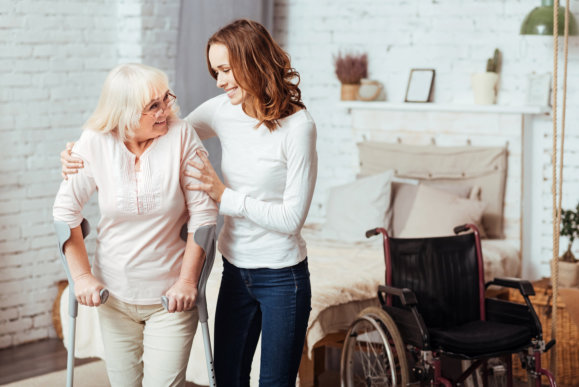Common Reasons Behind Your Aging Family Members’ Dizziness and Loss of Balance

Many factors can cause lightheadedness and unsteadiness among seniors. That said, it is important to know what these factors are since they can lead to falls and other accidents that may cause injuries in your loved ones. They may also be indicative of underlying medical issues, so, allow us at Serenity Senior Care to share some information to help your loved ones receive the best possible home care services in Bloomfield, New Jersey.
- Issues related to physical fitness
An individual’s sense of balance is dependent on the balanced interplay of their senses of touch, sight, hearing, and their spine, which senses their body’s position. The brain processes the signals sent by these areas in order to provide you with a sense of your spatial orientation your balance. When any of these systems do not function well, balance problems may occur. Since these factors deteriorate as people age, it is no wonder, therefore, that individuals experience postural instability in their golden years and will require nursing care in New Jersey. - Problems in the central nervous system
Cardiac issues and other disorders related to one’s central nervous system can also cause balance problems. For instance, stroke is known as the most common neurological disorder that can cause balance control problems. They may also result from dementia, which causes a disconnect between patients’ sensory signals and spatial consciousness, or Parkinson’s disease, which causes interruptions in neurological processes.
How to Respond When a Loved One Hits an Impending Dizziness or Balance Crisis
- Remain calm.
- Assess the individual’s balance or dizziness episodes with the acronym WHOOSH:
- W – weakness or feeling of falling
- H – head pressure, pain, congestion due to sensory overload
- O – orthostatic hypotension (low blood pressure when standing)
- S – a sudden spell usually due to nerves and anxiety about their physical state or environment
- Find out more.
- Have objective information from a medical professional about the type of dizziness or balance problem your elderly loved one is experiencing.
- Find support for this individual and the family through a dizziness/balance center, online support groups, health care professionals who specialize in balance disorders, and publications such as Balance Matters for Seniors .
- Be patient, empathetic, calm and reassuring with these individuals when they are having dizziness or balance problems.
What Should You Do When Your Aging Family Members Experience Dizziness or Loss of Balance?
- Ask your loved one if they want you to find out more about their condition.
- Tell them you will help them get the most accurate and up-to-date information possible and that anything helps – a little rest, medication, a change in activity level or weather can often relieve dizziness.
- Explain that dizziness or balance problems are common in older adults and it is quite normal for them to experience this.
- Help them accept the fact that they are not going to get better by themselves.
- Encourage your loved one to set realistic goals which are based on their current abilities and physical condition.
- Be there for them when they need you while providing support, reassurance, and information with regard to their treatment plans as well as rehabilitation programs to help ease their symptoms or cure their illness.
- Offer a gentle reminder if they forget to take medications or not follow their treatment plan.
- Try to distract your loved one from the dizziness or balance problem by engaging them in activities in which they are involved and where they feel comfortable.
- Talk with them about how you are doing and ask them how you can be of help to them by discussing their needs and what is good for them while encouraging them to still do things they enjoy, but reducing any pressure or anxiety they may feel because of their condition.
- Keep in touch with your loved one to keep yourself aware of their condition as well as the changes in their health so you can help them stay off balance if it becomes important.
- Keep a positive attitude and communicate your love and support for your loved one by sharing memories, and making extra effort to stay connected with them such as planning special times for quality time together like going out to dinner, taking walks, or time spent in the sun outdoors, or visiting a museum.
- Let them know you care and are always willing to help.
- Keep a positive attitude and communicate your love and support for your loved one by sharing memories, and making extra effort to stay connected with them such as planning special times for quality time together like going out to dinner, taking walks, or time spent in the sun outdoors, or visiting a museum.
- Many older adults appreciate gifts like cards with personal messages from friends and family members which refresh their spirits while sustaining their memories of the past when they felt loved.
- Be patient, empathetic, calm and reassuring with these individuals when they are having dizziness or balance problems.
According to the National Institute on Deafness and Other Communication Disorders, medications may also be part of the reasons why your senior loved ones who are receiving senior care in New Jersey may be dealing with balance issues. While many older individuals have to take multiple prescriptions for their health conditions, not all these medications work well together. Moreover, people react differently to medicines, so it is crucial that you consult your aging family members’ healthcare providers if you believe that their prescriptions are the reason behind their balance problems.


